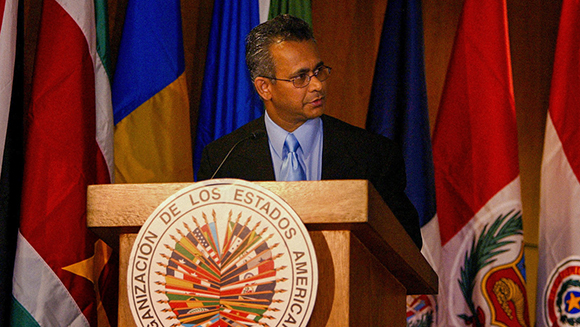
United Nations, June 3rd. - Albert Ramdin was elected with the support of the vast majority of member countries of the Organization of American States (OAS).
Albert Ramchand Ramdin took office as Secretary General of the Organization of American States (OAS) last Saturday, a change in the Pan-American international organization that aims to overcome the controversies that marked the tenure of his predecessor, Uruguayan Luis Almagro.
Ramdin, a 67-year-old Surinamese, was elected on March 10, leading a candidacy supported primarily by Caribbean nations and progressive governments in the region, such as Brazil, Colombia, and Mexico. This is the first time in the history of the OAS that a representative from the Caribbean has been elected to this position.
Ramdin served as Suriname's Foreign Minister until May 25, when Almagro's term ended and his country held general elections. Prior to that, he served as Deputy Secretary General of the OAS for two terms (2005-2015), when the organization was headed by Chilean José Miguel Insulza . His relationship with the organization began almost a decade ago, in 1997, when he was appointed ambassador and permanent representative of his country to the institution and later political advisor to the Secretary General.
The new Secretary General is a career diplomat with five years of experience in his country's political leadership, where, in addition to serving as a minister, he served as Vice President of the Council of Ministers and Second Vice President of the National Security Committee.
During that period, he also combined his government duties with the presidency of the Executive Council of the Association of Caribbean States (ACS) and the presidency of the Caribbean Cooperation and Development Council of the United Nations Economic Commission for Latin America and the Caribbean (ECLAC).
Born when the country was a colony of the Netherlands, Ramdim's native language is Dutch, and he is fluent in English and Spanish. He earned a degree in Social Geography from the University of Amsterdam, where he focused on the problems of Latin American economies.
Her mandate is expected to boost diversity and representation of small Caribbean nations within the organization, some of which are facing various crises, particularly in terms of public debt and citizen security.
He has also been known for advocating for greater and better support for Haiti, a Caribbean country facing a multiple crisis, with institutional problems, gang conflicts, and famine.
Likewise, the website he launched as a candidate included some of his ideas, such as his commitment to policies to mitigate climate change, maintain peace, and promote sustainable development.
There are also abundant references to equity, the strengthening of international financial institutions, as well as to unity, inclusiveness, and recognition of the region's diversity.
Throughout its history, the OAS has been the subject of numerous criticisms and controversy. The organization has been accused of bias in conflict resolution, especially in its stance toward the Venezuelan government, which has been frequent during the term of outgoing Secretary General Almagro.
Thus, in 2019, the entity was accused of interfering in Bolivia's internal affairs in relation to the general elections held that year and the subsequent political crisis.
In 2018, Almagro made international headlines when he said, referring to former Spanish President José Luis Rodríguez Zapatero, "My advice is not to be an idiot," prompting a formal protest from the Spanish government.
Strong criticism of its bias has marked the organization's entire history, from its expulsion from Cuba in 1962 for its adherence to Marxism-Leninism, to its silence regarding the U.S.-backed coups in Uruguay, Argentina, and Chile, and its mutism regarding the death of Chilean President Salvador Allende.
Albert Ramdin is now expected to emerge as a unifying figure, remaining impartial in internal and international disputes, facilitating dialogue, and promoting policies beneficial to all states, including the smallest in the Caribbean. (Text and Photo: Cubadebate)